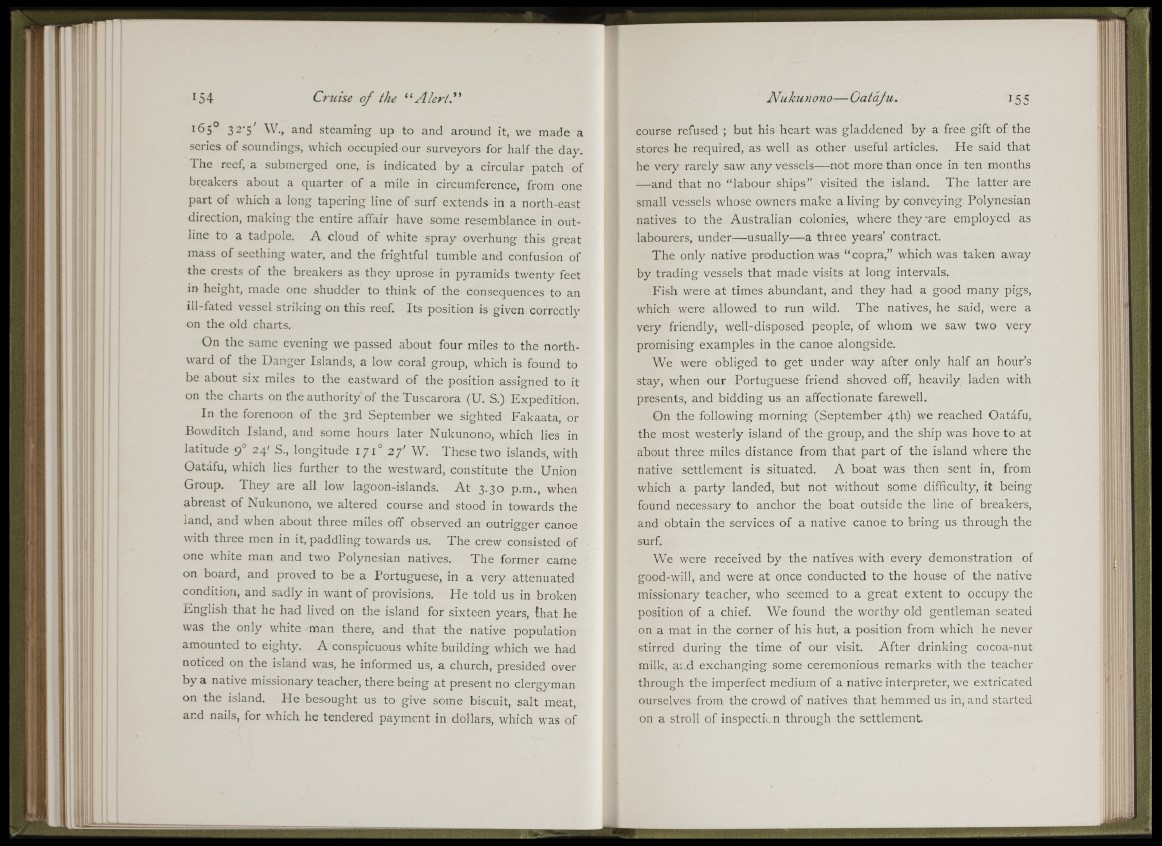
165° 32-5' W., and steaming up to and around it, we made a
series of soundings, which occupied our surveyors for half the day.
The reef, a submerged one, is indicated by a circular patch of
breakers about a quarter of a mile in circumference, from one
part of which a long tapering line of surf extends in a north-east
direction, making the entire affair have some resemblance in outline
to a tadpole. A cloud of white spray overhung this great
mass of seething water, and the frightful tumble and confusion of
the crests of the breakers as they uprose in pyramids twenty feet
in height, made one shudder to think of the consequences to an
ill-fated vessel striking on this reef Its position is given correctly
on the old charts.
On the same evening we passed about four miles to the northward
of the Danger Islands, a low coral group, which is found to
be about six miles to the eastward of the position assigned to it
on the charts on the authority of the Tuscarora (U. S.) Expedition.
In the forenoon of the 3rd September we sighted Fakaata, or
Bowditch Island, and some hours later Nukunono, which lies in
latitude 9° 24' S., longitude 171° 27' W. These two islands, with
Oatafu, which lies further to the westward, constitute the Union
Group. They are all low lagoon-islands. A t 3.30 p.m., when
abreast of Nukunono, we altered course and stood in towards the
land, and when about three miles off observed an outrigger canoe
with three men in it, paddling towards us. The crew consisted of
one white man and two Polynesian natives. The former came
on board, and proved to be a Portuguese, in a very attenuated
condition, and sadly in want of provisions. Pie told us in broken
English that he had lived on the island for sixteen years, Ihat he
was the only white man there, and that the native population
amounted to eighty. A conspicuous white building which we had
noticed on the island was, he informed us, a church, presided over
by a native missionary teacher, there being at present no clergyman
on the island. He besought us to give some biscuit, salt meat,
and nails, for which he tendered payment in dollars, which was of
course refused ; but his heart was gladdened by a free gift of the
stores he required, as well as other useful articles. He said that
he very rarely saw any vessels— not more than once in ten months
— and that no “ labour ships” visited the island. The latter are
small vessels whose owners make a living by conveying Polynesian
natives to the Australian colonies, where they-are employed as
labourers, under— usually— a thiee years’ contract.
The only native production was “ copra,” which was taken away
by trading vessels that made visits at long intervals.
P'ish were at times abundant, and they had a good many pigs,
which were allowed to run wild. The natives, he said, were a
very friendly, well-disposed people, of whom we saw two very
promising examples in the canoe alongside.
We were obliged to get under way after only half an hour’s
stay, when our Portuguese friend shoved off, heavily laden with
presents, and bidding us an affectionate farewell.
On the following morning (September 4th) we reached Oatafu,
the most westerly island of the group, and the ship was hove to at
about three miles distance from that part of the island where the
native settlement is situated. A boat was then sent in, from
which a party landed, but not without some difficulty, it being
found necessary to anchor the boat outside the line of breakers,
and obtain the services of a native canoe to bring us through the
surf.
We were received by the natives with every demonstration of
good-will, and were at once conducted to the house of the native
missionary teacher, who seemed to a great extent to occupy the
position of a chief. We found the worth}' old gentleman seated
on a mat in the corner of his hut, a position from which he never
stirred during the time of our visit. After drinking cocoa-nut
milk, and exchanging some ceremonious remarks with the teacher
through the imperfect medium of a native interpreter, we extricated
ourselves from the crowd of natives that hemm.ed us in, and started
on a stroll of inspecticn through the settlement
i'i
mi
HI:
.»I
'ift